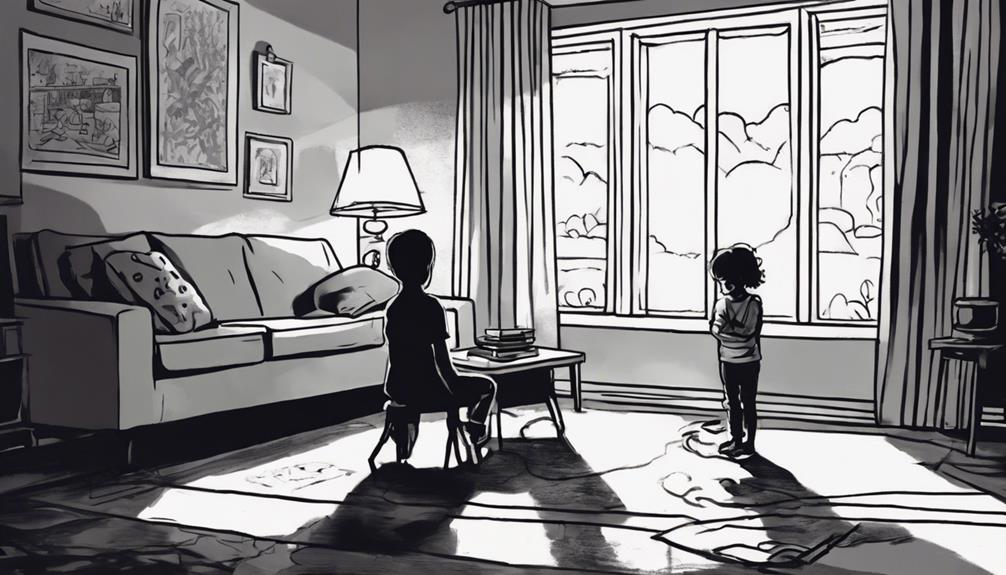Secret affairs can deeply affect your children, leading to emotional distress and trust issues. They might feel confused or betrayed, which can trigger anxiety, mood swings, and withdrawal from friends and family. These feelings often disrupt the bond with you, as they may perceive your emotional unavailability. Academically, they might struggle to concentrate, resulting in a performance drop. Long-term, they may carry these experiences into their adult relationships, struggling with attachment and trust. Understanding these impacts is essential for their emotional healing and resilience, and exploring supportive strategies can help them navigate these challenging emotions.
Emotional Distress in Children

When parents engage in secret affairs, children often experience profound emotional distress that can manifest in various ways, impacting their mental health and sense of security.
You may find yourself grappling with feelings of confusion and anxiety, as you try to make sense of the unfolding situation. This emotional turmoil can lead to behavioral changes, such as withdrawal from friends, declining academic performance, or even acting out in anger.
The psychological effects of such situations can be long-lasting, potentially shaping your view of relationships and trust. You might feel a sense of betrayal, even if you're not directly involved, as the family dynamics shift and become unpredictable. The chaos can create an environment where you feel insecure and unsafe, as the very foundations of your family life seem to crumble.
Moreover, your ability to process emotions may be hindered, making it harder to express what you're feeling. Recognizing these emotional responses is vital for your well-being.
Seeking support from trusted adults or professionals can help mitigate these psychological effects, guiding you through the complex feelings that arise from your parents' choices.
Trust Issues and Betrayal
Secret affairs can deeply fracture your sense of trust, leaving you to grapple with feelings of betrayal that can seep into every aspect of your life. When a parent engages in infidelity, it disrupts not just the romantic relationship but also the core of family dynamics. You might find yourself questioning the reliability of your parents' words, actions, and even their love for you.
Trust development is vital for emotional security, especially during formative years. Children look to their parents as role models, so witnessing betrayal can create lasting scars. It makes you wonder if honesty and loyalty are mere illusions. You may struggle with trust in your own relationships, battling the fear that betrayal lurks around every corner.
As these feelings manifest, they can lead to anxiety and insecurity, affecting how you interact with peers and authority figures. The ripple effect of a secret affair extends far beyond the immediate family, creating a shadow of doubt that can influence your worldview.
Understanding these dynamics is essential for managing your emotions and rebuilding trust, both within your family and in your future relationships.
Impact on Parent-Child Relationships

The revelation of a parent's affair can create a chasm in the parent-child relationship, often leaving you feeling isolated and questioning the authenticity of your bond. You might find it challenging to engage in open parental communication, as the emotional fallout can make your parent less available to you. Their focus may shift towards managing their own guilt and shame, leaving you feeling neglected and unsupported.
In such a turbulent environment, you might struggle to understand your parent's emotional availability. Instead of feeling like a confidant, you may feel like an outsider. This shift can lead to a breakdown in trust, making it harder for you to approach your parent with your feelings or concerns. As you grapple with conflicting emotions, the intimacy of your relationship can suffer considerably.
It's essential to navigate these feelings carefully. Open discussions can pave the way for healing, but it's equally important for your parent to recognize and address their emotional obligations towards you. Acknowledging the impact of their actions on your relationship can help restore some balance and reconnect you both, fostering a healthier dynamic moving forward.
Behavioral Changes and Reactions
Unraveling family dynamics often leads to noticeable behavioral changes in children, as they react to the emotional upheaval caused by a parent's affair. You might see your child becoming withdrawn, anxious, or even aggressive, as they struggle to make sense of the situation. These behavioral triggers can manifest in various ways, impacting their social interactions with peers and family alike.
Children may express their confusion through mood swings or irritability, often feeling torn between loyalty to each parent. They might also struggle to trust others, leading to difficulties in forming friendships or maintaining existing ones. This disruption can create a cycle where their anxiety about home life spills over into their social settings, making it hard for them to engage positively.
As a parent, it's essential to recognize these signs and address the underlying emotional turmoil. Open communication can help your child articulate their feelings, fostering a sense of security. By validating their emotions and encouraging healthy social interactions, you can support them in steering through this challenging experience, ultimately aiding in their emotional resilience.
Academic Performance Decline

Children often experience a decline in academic performance when their home life is disrupted by a parent's affair, as the emotional strain can make it difficult to concentrate on schoolwork. You might notice that your child is more distracted or withdrawn, which can lead to significant school performance issues.
The stress of managing their parents' relationship turmoil often results in an academic motivation decline, leaving them feeling overwhelmed and unable to focus on their assignments. As their emotional well-being deteriorates, grades may slip, and participation in class may wane.
You might find that your child's once strong interest in learning is replaced by apathy, making it challenging for them to engage with peers and teachers. This decline isn't just temporary; it can affect their self-esteem and confidence in their abilities, creating a cycle of frustration.
Recognizing these signs early can help you provide the support your child needs. Open communication and a stable home environment can mitigate some of the negative effects, enabling them to regain their academic footing.
It's essential to be mindful of their emotional state, as it directly influences their ability to thrive in school during such turbulent times.
Long-Term Relationship Patterns
As children witness the fallout from a parent's secret affair, they often develop long-term relationship patterns that can shape how they connect with others in adulthood. These experiences can influence their attachment styles, which define how they approach intimacy and trust in future relationships.
For instance, if you saw betrayal within your family, you might struggle with trusting partners, fearing they'll also be unfaithful. You may find yourself leaning towards an anxious attachment style, where you constantly seek reassurance, or perhaps a dismissive style, where you avoid closeness altogether.
These patterns can lead to challenges in maintaining healthy relationships, as you might unconsciously replicate the dynamics you observed during childhood.
Moreover, the emotional turmoil stemming from a parent's affair can cause you to question your own worthiness, leading to either people-pleasing behaviors or a reluctance to engage deeply with others.
Recognizing these patterns is essential; it empowers you to break the cycle and foster healthier connections. By understanding how your past shapes your present, you can take proactive steps toward building more fulfilling and secure relationships in your life.
Coping Mechanisms for Children

Steering through the emotional fallout of a parent's secret affair can be overwhelming, but developing effective coping mechanisms can help you process your feelings and regain a sense of stability.
One powerful approach is play therapy. It allows you to express complex emotions through play and creativity, making it easier to articulate feelings you might struggle to verbalize. This method can be particularly beneficial for younger children, as it provides a safe space to explore their emotions without the pressure of adult conversation.
Building emotional resilience is another vital aspect. You can cultivate this by practicing mindfulness techniques, such as deep breathing or journaling. Reflecting on your feelings helps you understand and validate your emotional responses. Surrounding yourself with supportive friends or family members who can listen without judgment also fosters resilience.
Engaging in physical activities—whether it's sports, dance, or simply going for a walk—can release pent-up emotions and improve your mood.
Conclusion
Secret affairs can deeply affect children, leaving them grappling with emotional distress and trust issues.
They may struggle to navigate their feelings about loyalty and betrayal, which can strain their relationships with you.
Behavioral changes and declines in academic performance often emerge as they process the upheaval.
Understanding these impacts is vital for fostering a supportive environment.
By recognizing their struggles and encouraging open communication, you can help your child cope and heal from the fallout of such situations.
